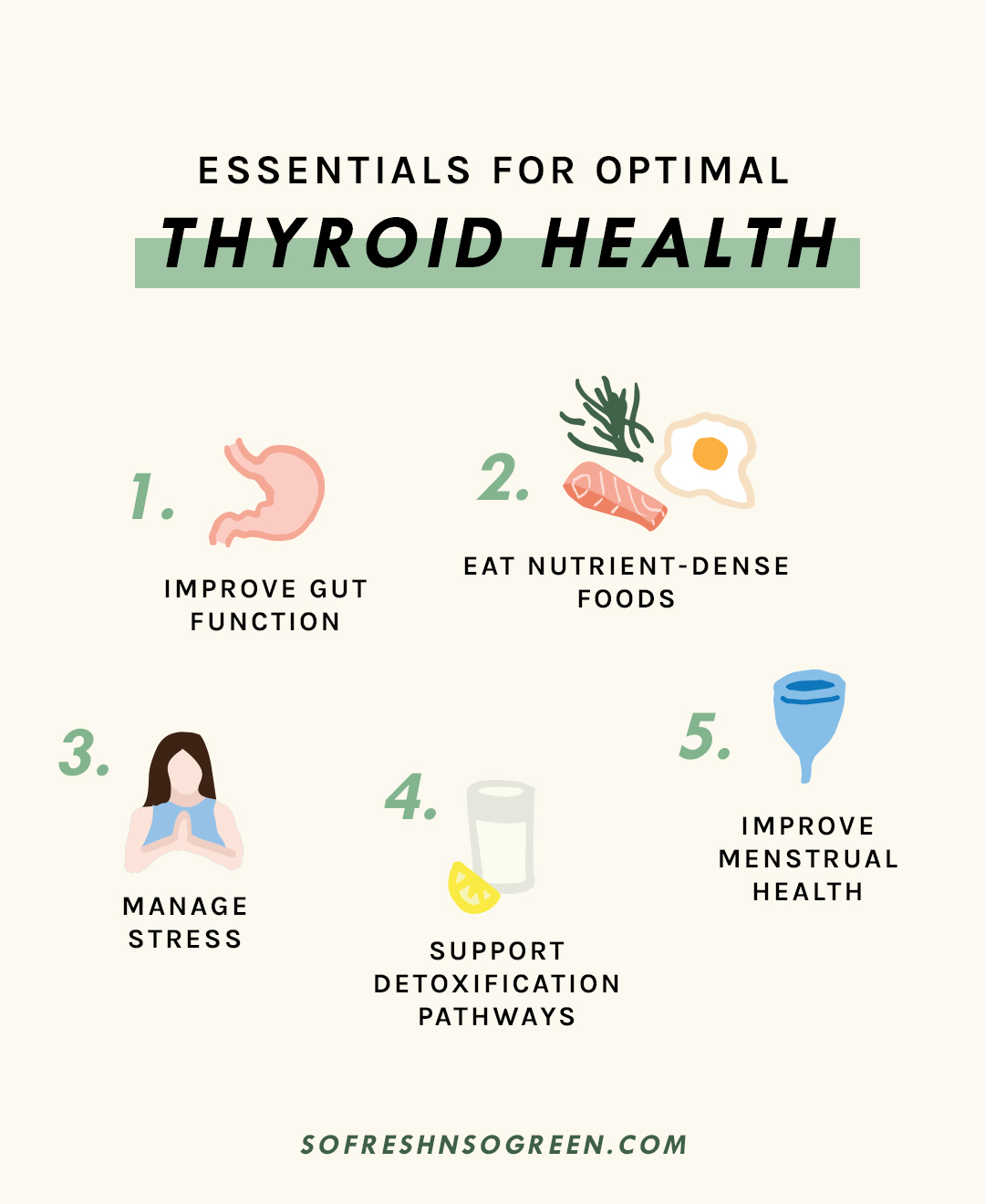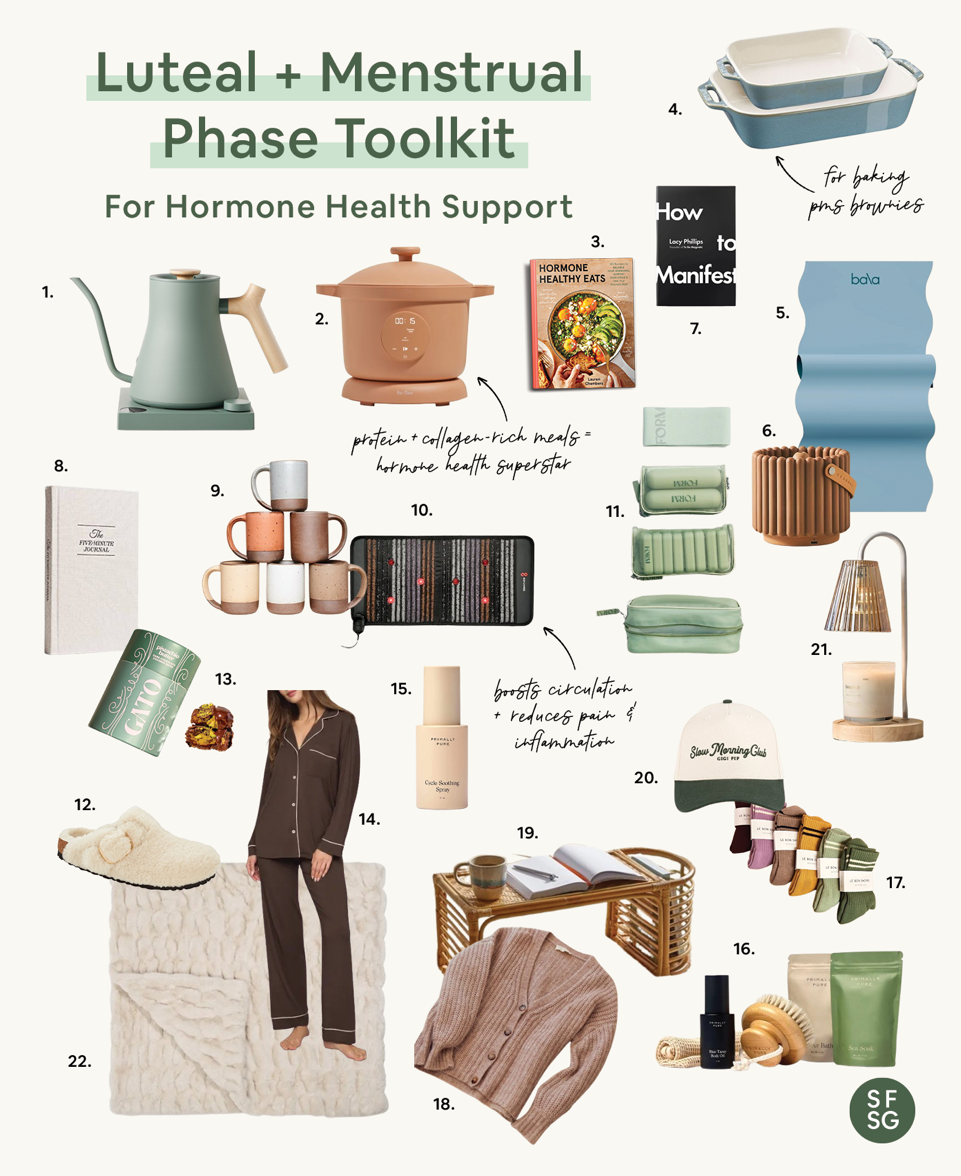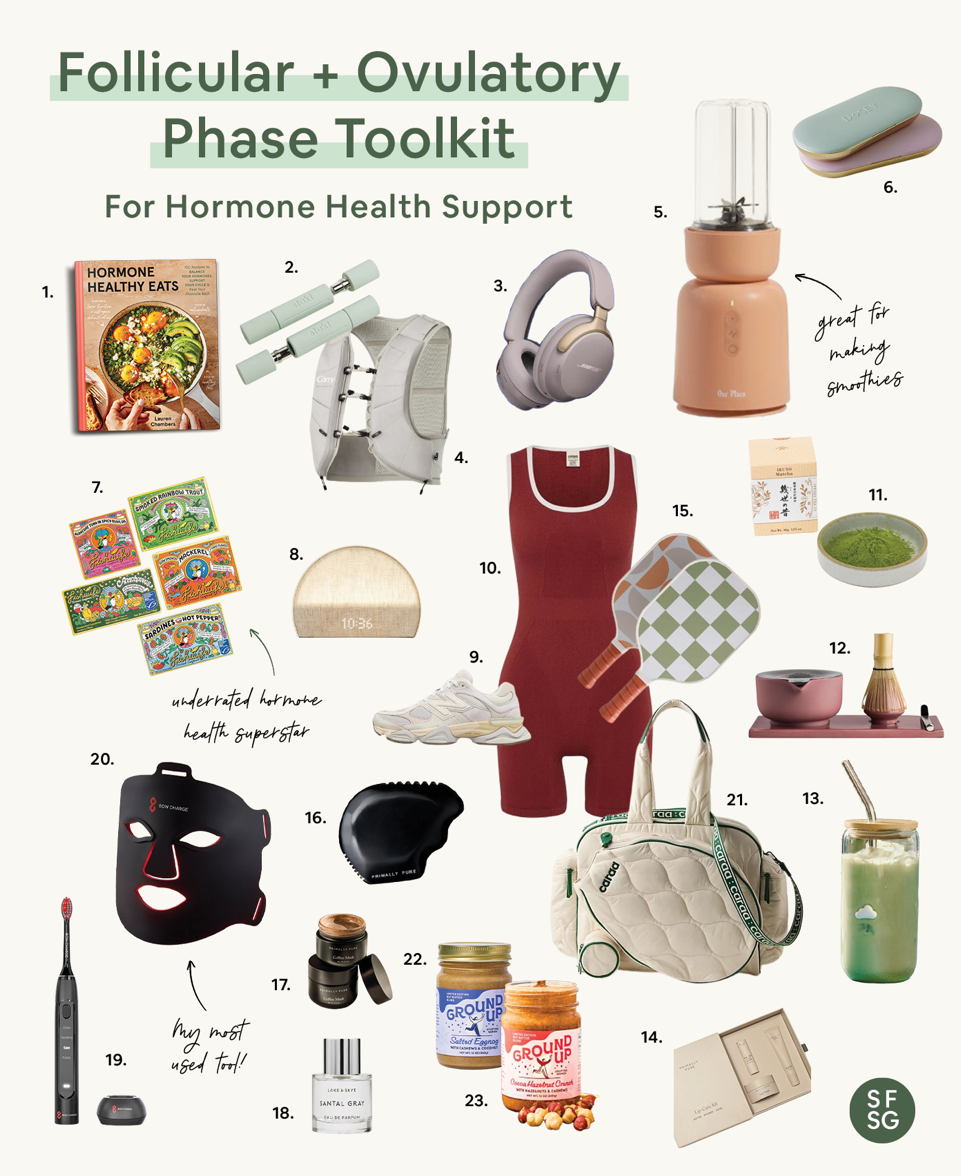recipes
lifestyle
wellness
motherhood
mindset
About
E-Books
Blog
Freebies
partnerships
hi, i'm lauren!
hey there!
I’m on a hot mission to help you balance your hormones & live your best life.
categories
Home
Quiz
Get In Touch
The Course
search:
Cookbook
Recipe key
GF
VG
P
Vegan
Gluten Free
Paleo
DF
Dairy-Free
download now
Join Hormone Healthy Eats!
Become a SFNSG insider to get my monthly Substack, Hormone Healthy Eats! Packed with the latest hormone-healthy recipes
+ tips.
jump to recipe >
As a nutrition + hormone health coach, one of the most common imbalances I see with female clients in my practice is a thyroid hormone imbalance (I also experienced it myself after having a baby).
This is not surprising, with 1 in 8 women expected to develop a thyroid disorder in her lifetime, and the fact that women are 8 times more likely than men to have thyroid problems (this seems to be attributed to the significant interaction between the thyroid and a woman’s reproductive hormones).
So, while thyroid disorders are common, they are NOT normal, and for any woman out there that has struggled with symptoms (such as rapid weight gain or an inability to lose weight (no matter how hard you try), fatigue, brain fog, constipation, postpartum anxiety, irregular cycles, infertility, dry skin or thinning hair, etc.) and have been or felt dismissed I want you to know I SEE YOU, and I hope this post provides you with some of the answers or support you may be seeking.
Additionally, you can try taking this Hormone Imbalance Quiz to further investigate symptoms.
Looking for recipes to help you balance thyroid hormones + boost metabolism naturally? Grab my go-to guide!
WHAT IS THE THYROID’S ROLE IN YOUR BODY?
Your thyroid is a butterfly shaped gland that sits low on the front of your neck. It has a lot of responsibilities that include regulation of your heart rate, blood pressure, and body temperature, which impact everything from your weight, fertility, menstrual cycle, skin tone, energy levels, sleep, memory, to digestion.
Your thyroid secretes different hormones to make all of this happen. These hormones include T4, which is an inactive form that’s released about 80% of the time into your bloodstream. In order for T4 to be effective, it needs to be converted to a form your body can actually use, which is the active version of the hormone known as T3.
Your pituitary gland also produces a thyroid stimulating hormone, called TSH, which is received by your thyroid as a message to make more thyroid hormone.
CAUSES + SYMPTOMS OF THYROID HORMONE IMBALANCE
+ Hypothyroidism
Symptoms of hypothyroidism include:
- + Fatigue
- + Weight gain
- + Sensitivity to cold
- + Brain fog
- + Thinning or straw-like hair
- + Memory problems
- + Dry skin
- + Constipation
- + Irregular or heavy periods
Root causes of hypothyroidism include:
- + Hashimoto’s Thyroiditis
- + Stress and HPA-axis dysfunction
- + Poor diet
- + Previous infections
- + Gluten intolerance or Celiac’s Disease
- + Toxin exposure
- + EMF exposure
- + Leaky gut
- + Vitamin D deficiency
- + Blood sugar imbalances
+ Hyperthyroidism
This is an overactive condition of the thyroid that can be caused by Grave’s disease.
Symptoms of Hyperthyroidism include:
- + Rapid heart rate
- + Weight loss
- + Increased appetite
- + Bulging eyes
- + Nervousness or anxiety
- + Fine, brittle hair
- + Difficulty sleeping
- + Sensitivity to heat
- + Irregular menstruation and infertility
- + Tremors
- + Fatigue
- + Muscle weakness
Root causes of Hyperthyroidism include:
- + Graves’ disease or autoimmune hyperthyroidism
- + Toxic thyroid mass
- + thyroid inflammation
+ Goiter
A goiter is a swelling of the thyroid. This may or may not be tender, and can usually be both seen and felt. Goiters most commonly arise due to iodine deficiency, although, they’re also seen in people with Graves’ disease and Hashimoto’s thyroiditis.
HOW THYROID HORMONE IMBALANCES AFFECT YOUR FERTILITY + MENSTRUAL CYCLE
Thyroid hormone imbalances have a big effect on a woman’s menstrual cycle, fertility, pregnancy health and postpartum recovery.
+ Irregular Periods
Hypothyroidism causes overproduction of prolactin. High prolactin levels decrease gonadotropin releasing hormone, so that FSH and LH production aren’t stimulated (which is crucial for ovulation).
Another effect of hypothyroidism is that it can worsen cases of polycystic ovarian syndrome. This can further exacerbate estrogen dominance and progesterone deficiency and can, therefore, cause irregular menstruation.
Hypothyroidism also robs the entire body of energy, which has an impact on the ovaries. The body can’t put effort into reproduction when it feels as though it’s struggling to survive. On the other hand, hyperthyroidism can result in lighter, shorter periods that are further apart. It can even progress to amenorrhea, which is the absence of a period altogether.
+ Infertility
Not only is a chance of ovulating slim due to low levels of prolactin, but because the thyroid isn’t functioning optimally, the body’s basal temperature – the temperature upon first waking – isn’t high enough for an embryo to survive.
+ Pregnancy Complications
Thyroid disorders are the second most common endocrine issue seen in pregnancy. In most women, it presents as hypothyroidism and can cause complications such as premature birth, preeclampsia, miscarriage, postpartum hemorrhage, anemia and abruption placentae.
+ Miscarriage
When a woman is pregnant, her body needs enough thyroid hormone to support a developing fetus and her own expanded metabolic needs. Healthy thyroid glands naturally meet increased thyroid hormone requirements. If someone has Hashimoto’s thyroiditis or an already overtaxed thyroid gland, thyroid hormone levels may decline further, leading to a miscarriage or pregnancy complications.
+ Postpartum Thyroid Disfunction
Postpartum thyroiditis is an autoimmune disease, so the cause is a combination of the stress of pregnancy, birth, and the postpartum period, all combined with the usual causes of autoimmune disease. These usual causes include psychological stress, poor diet, environmental toxins, electromagnetic frequency exposure, leaky gut, eating too much sugar, infection, and gluten intolerance.
For example, most new moms report decreased energy, fatigue, muscle aches, and changes in their hair and nails. But, when these are accompanied by troubling symptoms, like a high heart rate, tremors, extreme or debilitating fatigue, and even joint pain, it’s time to get to a doctor for testing and medical treatment.
COMMON THYROID HORMONE DISRUPTORS
Women are 8 times more likely than men to develop thyroid disease due to the fluctuation in our hormones with menstruation and pregnancy, as well as hormonal birth control use. While most of us cannot avoid the first two factors, there are plenty of common thyroid disrupters we can avoid. Here’s a breakdown:
+ Birth Control
The hormones used in the pill are not an exact match for the hormones produced by the body. They’re similar and hormone-like, but they’re not the same. The artificial estrogen in the pill still stimulates the estrogen receptor, but the message is distorted, and they can end up jamming the receptor open or closed. So, they don’t function in the body the same way that estrogen and progesterone do.
Specifically, the high dose of estrogen in birth control pills increases the activity of thyroxine binding globulin, or TBG, which binds thyroid hormone. More circulating TBG leads to lower levels of free thyroid hormone available for use by the body.
Birth control pills also deplete the body of crucial nutrients that are required for the thyroid to work properly, such as magnesium, selenium, and zinc.
+ Toxins
There are an abundance of toxins that exist in our environment that weren’t even around 100 years ago. In fact, over 80,000 chemicals are in use today just in the United States alone! And, the research is showing that toxic chemicals are messing with our thyroid health. A recent study done over a five-year period estimated that the number of people being diagnosed with thyroid disease has gone up by about 35%.
The thyroid is very sensitive to toxins, particularly those that impact how much iodine it has available to work with, meaning the toxins can interfere with iodine uptake or the body’s ability to use the iodine it has.
Most of these toxins wreak havoc on the endocrine system by disrupting its normal function. They show up in the body acting like copycats, causing confusion. These toxins all mimic a hormone normally produced in the body, disrupting the feedback system and causing the body to stop making its natural hormones.
For more on the specific toxins to look out for + smart swaps, check out my 28-Day Hormone Balance Reset Plan.
+ Nutrient-Void Diet
Your thyroid requires nutrients and trace minerals (such as iodine, selenium, magnesium, copper, zinc, etc. ) in order to make adequate amount of thyroid hormones. If you’re not getting enough of these nutrients through your diet, or not properly absorbing them due to gut dysbiosis (see below) then this deprives your thyroid of a key building block it needs to function, leading to a thyroid disorder.
+ Gut Dysbiosis
When your gut bacteria is unbalanced, food isn’t absorbed well, and larger molecules are able to cross the gut wall, increasing inflammation in the body. This can provoke an immune response and can cause an autoimmune condition if left untreated, typically Hashimoto’s Thyroiditis.
+ Gluten/Grains
A key factor in improving the thyroid is to avoid wheat, and possibly other grains, as they are able to penetrate the gut wall (see above), provoking an immune response in the body. In fact, people with untreated celiac’s disease are three times more likely to have a thyroid condition.
+ Stress
During times of stress, our HPA axis instructs our adrenals to make stress-hormone cortisol. This cortisol then affects the pituitary gland, making it slower to send out its signals. TSH production then decreases, so the thyroid doesn’t get the signal that it needs to make more thyroid hormone. This can result in decreased levels of thyroid hormones, which can lead to hypothyroidism.
HOW TO BALANCE THYROID HORMONES NATURALLY
+ Improve Gut Function
As we covered earlier, gut dysbiosis can interfere with proper thyroid function. In order to optimize gut function try including fermented foods + probiotics daily, limiting sugar + increasing fiber intake and eliminating gluten/grains.
+ Eat A Nutrient-Dense Diet That Supports The Thyroid
The following include foods rich in key nutrients your thyroid needs to function optimally:
+ Iodine — Foods rich in iodine help the thyroid make the hormones it needs to regulate metabolism. Try adding artichokes (I love roasting or grilling them and dipping them in aioli), roasted seaweed snacks, nori wraps for homemade sushi, hand rolls or wraps, onions, seafood, pasture-raised eggs, navy beans and pineapples.
+ Essential Fatty Acids — These are essential for implantation of an egg if trying to get pregnant and play a key role in thyroid health. Sneak in wild salmon and leafy greens and try adding a tablespoon of flax or chia seeds to your smoothie, oatmeal or yogurt bowl.
+ Coconut Butter + Oil — Raw saturated far is quickly converted into energy and helps to regulate thyroid function. Try cooking or baking with it or drizzling it over toast, oatmeal, or adding to smoothies.
+ Copper + Iron — Having enough iron will help your body manufacture thyroid hormones and copper supports hypothalamus function, which communicates with the thyroid and other hormones to make sure everything is running smoothly. Lentils, spinach, dark chocolate, beans, red meat, eggs, broccoli and pumpkin seeds are rich in iron, while most nuts, seeds, seafood and dark chocolate are a good source of copper.
*One caveat to this is with a copper IUD. If you’ve been using a copper IUD for birth control (aka Paraguard) you will need to detoxify from copper before getting pregnant as it can really throw your mineral balance off. Try adding chlorella drops to your water or a scoop of spirulina to your smoothie.
For more thyroid-boosting recipes + foods, check out my 28-Day Hormone Balance Reset Plan.
+ Manage Stress
As you now know, chronic stress can lead to a decrease in thyroid hormone production, leading to hypothyroidism. Try incorporating more stress management practices into your routine like deep breathing, yoga, meditation, reading, a grounding morning or nighttime routine, quality time with friends and family, journey, epsom salt baths, essential oils or getting off electronic devices and out in nature.
+ Support Detoxification Pathways
Chemicals such as PCBs, dioxins and xenoestrogens (like BPA and phthalates) bind to cells in our immune and endocrine systems, as well as the delicate tissue in our thyroid glands, damaging their function. These toxins are often found in our water supply, processed foods, conventional beauty products, household cleaning + laundry items and plastic, to name a few.
In order to avoid where possible, try downloading the Think Dirty app to check the toxic rating of products (I suggest starting with those you use every day, like face wash, deodorant or counter spray, and working your way through the list slowly so not to overwhelm yourself).
Also look into getting a quality water filter and sustainable water bottle (i.e. no more drinking out of plastic water bottles).
You can snag a full list of toxins to look out for + easy non-toxic swaps and naturally detoxifying recipes with my 28-Day Hormone Balance Reset Plan.
+ Improve Menstrual Health
Estrogen dominance has a detrimental effect on the thyroid and thyroid abnormalities can have a negative effect on the menstrual cycle – it’s all one big feedback loop. This means it’s ideal to keep estrogen levels as close to normal as possible to avoid creating a cycle of thyroid and menstrual irregularities.
In order to do this, try a non-hormonal birth control option, like the Paragard IUD, Femcap or diaphragm, or a fertility awareness method-based birth control.
It’s also important to limit exposure to estrogen mimickers (such as BPA found in plastic and all soy foods/products), as well as reduce alcohol as it impairs the liver’s ability to process estrogen effectively.
Avoid taking antibiotics to maintain a healthy gut flora, as unhealthy intestinal bacteria can cause estrogen to be recirculated in the body. Additionally you can try adding in an activated B-complex to support a healthy cycle.
Last but certainly not least, the 28-Day Hormone Balance Reset Plan literally contains all the info (+ recipes) to help you improve your menstrual health.
BOTTOMLINE
If you think you have a thyroid imbalance, I highly encourage you to seek support from a Functional Medicine Practitioner that specializes in hormone health.
Additionally you can try taking this hormone imbalance quiz to investigate your symptoms or follow my 28-Day Hormone Balance Reset Plan to help you naturally balance your hormones and optimize thyroid health.
MORE THYROID HORMONE BALANCING RESOURCES
This post contains affiliate links. We may receive a small commission for purchases made through these links. Thank you for your support!

If you loved that...

01.

02.

03.

04.

05.
hey!
Keep Browsing
Site
Keep Browsing
Site
the
about
e-books
blog
downloads
quiz
Welcome friend, I'm lauren.
I’m honored to support you on your journey to optimal hormone health + happiness. Thanks for being here babe.


